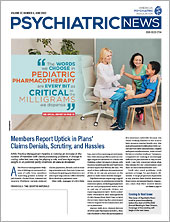The Mental Health Parity and Addiction Equity Act of 2008 was supposed to be a game changer to improve access to mental health care by ensuring that health plans provide equal coverage for both physical and mental health treatment.
Yet 14 years later, patients seeking mental health care still run into seemingly insurmountable barriers. Some cannot find a professional who takes their insurance, and their health plans’ directories are often wrong or outdated. Others have their inpatient hospital stays cut short by their insurers, regardless of their doctors’ orders. Still others run into onerous prior-authorization requirements that further delay needed care.
Additionally, the lack of integration between physical and mental health care all too often prevents patients from accessing the mental health care they need. “Mental health should not be fenced off from the rest of the health care system. This lack of integration can be fatal,” said Sen. Ron Wyden (D-Ore.), chair of the Senate Committee on Finance, during the committee’s hearing, “Behavioral Health Care When Americans Need It: Ensuring Parity and Care Integration.”
Prior to the hearing, the committee released a report that details its planned next steps to understand the country’s mental health crisis and to craft a legislative package, which it plans to consider this summer. APA has advocated vigorously around parity enforcement and integrated care throughout the 117th Congress, building off legislative successes during the 116th Congress. APA’s staff have worked with members of the House and Senate to introduce legislation that helps states properly implement and enforce parity, as well as legislation that helps primary care practices implement the collaborative care model (CoCM).
APA member Anna Ratzliff, M.D., Ph.D., testified before the committee at APA’s recommendation. She is the co-director of the Advancing Integrated Mental Health Solutions (AIMS) Center and a professor at the University of Washington. She shared the potential of CoCM to expand access to care, save costs, and improve health equity, illustrating her points with the case of a patient she had worked with through CoCM, whom she called Daniel.
“Daniel is a young adult who had been struggling with untreated mental health conditions since he was an adolescent, and these eventually led to a suicide attempt,” she said. He visited his primary care provider, who recognized his symptoms and connected him to a behavioral health care manager whose office was just down the hall. “As a psychiatric consultant, I was able to review his case within a few days during my regular meeting with the behavioral health care manager,” she said. “This approach allowed me to review multiple patients in the clinic in the same time it would normally take me to see only one patient.”
Ratzliff was able to determine Daniel’s diagnosis and recommend treatment. “Within weeks, he was feeling better, and he enrolled in a local community college,” she said. “This example is important because Daniel says he never would have sought mental health care if it hadn’t been so seamlessly available in his primary care setting. And his mother feels that this access saved his life.”
She urged the senators to adopt policies that would significantly improve access to quality mental health care, including funding primary care practices to assist with the startup costs associated with implementing CoCM, removing cost-sharing requirements under Medicare, and increasing reimbursement for CoCM to more appropriately reflect the value and benefits of the care provided.
Other witnesses included John Dicken, director of the U.S. Government Accountability Office’s health care team; Andy Keller, Ph.D., president and CEO of the Meadows Mental Health Policy Institute in Dallas; and Reginald Williams II, vice president for international health policy and practice innovations with the Commonwealth Fund.
During the hearing, Wyden asked about ghost insurance networks, a term that refers to networks that list health care professionals in their directories who are not accepting patients or are no longer on their provider panels, leaving the patient without any options.
“I’ve had patients who needed care go to their insurers’ provider directories and call, sometimes, 30 or 40 providers, only to be told there was no availability, be put on a waitlist, or just never receive a response,” Ratzliff said. “This often resulted in people not being able to access the care they needed.”
“I personally think this is making a mockery out of the parity law,” Wyden said. During the hearing, he was adamant that he and his colleagues were taking action to address the lack of mental health parity enforcement among insurers, which was recently highlighted in a report from three government agencies (“
Government Steps Up Efforts to Enforce Parity Law”). Wyden said he believes more must be done to hold the executives of insurance companies accountable.
Patients seeking mental health care are “all too often bogged down in insurance company foot dragging, red tape, and piles of excuses,” Wyden said. “This committee is coming together to finally fix this on a bipartisan basis.” ■

